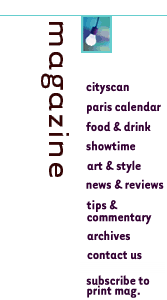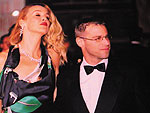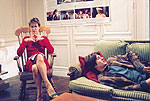A boyish 39 year old, in jeans and sneakers, with a pouch bag slung across his jacket, clubber-style… first-time filmmaker Andrew Litvack projects “French Touch” cool, yet turns out to be an archetypal “New Yorker in Paris.” In the “City of Light” since 1987, he came here “after graduating from college, in literature… to learn the language,” and made a name for himself subtitling films by the likes of Jean-Luc Godard, “I did all kinds of pictures, really, even “Les Visiteurs!”. Further down the road, he did a stint with James Ivory: “I wasn’t his First Assistant. But, I helped the French actors rehearse, and once he let me direct a scene.” Why Paris? “Because it’s unusual, wonderful, different! Otherwise, to make movies, I suppose I’d have had to head for LA, and I can’t envision that!”
Andy Litvack appears to live in a world in which “anything can happen,” and his film “Merci… Dr Rey!” — a Merchant Ivory production, to be released here during the first week of December — reflects that.
“Merci… Dr Rey!” won’t be translated as “Thank you… Dr Rey!” — in English, the title will be “Merci, Dr Rey!” with a comma, instead of the dots — “because it shouldn’t just sound like someone’s thanking their doctor.” In fact, there’s more to this “spoof on psychoanalysis” than meets the eye. Set in Paris, it’s “part thriller, part comedy… with a whiff of Frenchness” as the protagonists “slip in and out of French depending on where they’re from and who they’re talking to,” much as Litvack does with Jane Birkin (so “droll” in the role of a gawky “adulescent older woman”). As he points out — “She and I are the same, we’ve left our country behind, and adopted another… sometimes we speak to each other in French.”
The protagonist of “Merci… ” is a gay young man (Stanislas Merhar) who lives alone in a big apartment with his mom, an ageing soprano (Dianne Wiest) who’s hysterical at the prospect of singing in “Turandot” at Paris’ Opéra Bastille. Is this “a gay movie”? Yes and no. But, not in the sense that might be described as “rue des Archives attitude.” There are no “pecs” and “butts” in this “odd ball” whodunit murder mystery. According to Andrew Litvack, who claims he’s “not into labels,” even the initial references to gay “phone sex” are brought in “as a way of explaining the crime, that gets the plot going.” In his opinion, are all “queen moms” detrimental diva’s like Wiest’s character, or is that just a stereotype? “It’s not a stereotype, it’s an archetype,” says Andy who’s “very up on psychoanalysis — je suis très calé en psychanalyse — you know…,” adding that after a decade of analysis, he’s not quite ready to “cut off” yet.
If anything, in this “you’ll love it or hate it” movie, homosexuality is just used as an “extended metaphor” for a string of “hang-ups.” However, both Litvack and Birkin agree that the audience’s response is “something else” at gay and lesbian film fests. “On one occasion the laughter was so uproarious that we couldn’t hear the lines. I’m glad James Ivory was in the room to witness it, because I could hardly believe it myself!”




